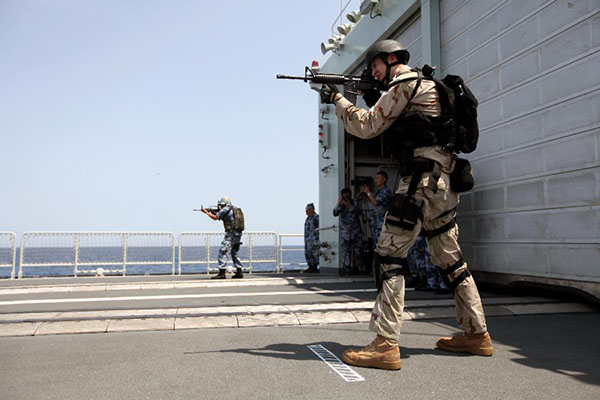US' accusation about anti-terror law
Updated: 2015-12-30 08:54
By Shen Dingli(China Daily)
|
||||||||
 |
|
Chinese and US soldiers participate in joint counter-piracy exercise on the missile destroyer "Harbin" of Chinese navy in the Gulf of Aden, in this Aug 25, 2013 file photo. [Photo/Xinhua] |
The Standing Committee of the National People's Congress, China's top legislature, approved the country's first counterterrorism law on Sunday. The new law, which will enter into force on Friday, proposes a national leading body to identify terrorist activities and personnel and coordinate nationwide anti-terrorist work. This will help fight terrorism at home and help maintain global security.
Yet, in the eyes of US State Department spokeswoman Gabrielle Price, the law "will do more harm than good against the threat of terrorism", because it will "lead to greater restrictions on the exercise of freedoms of expression, association, peaceful assembly, and religion within China", and "constrict US trade and investment in the country".
Such a statement is hardly a surprise, as Washington has long taken pride in its self-proclaimed role as a champion of freedom of speech, which has actually been restricted by legislation since the terrorist attacks on Sept 11, 2001. The truth is the country's law enforcement departments never compromise when it comes to lawfully fighting terrorism and silencing those seeking to incite terrorist acts, which is basically a consensus of most Americans.
Known as any activity that by means of violence, sabotage or threat, generates social panic, undermines public security, infringes on personal and property rights, and menaces government organs and international organizations, terrorism and its derivative ideology must be properly dealt with. Curbing the dissemination of extremist ideas is not violating basic human rights; instead, it is protecting the rights of the majority.
That Washington accused Beijing's new counterterrorism law of infringing on freedom of speech, without referring to its own actions, is solid evidence of its double standard.
Earlier this year, US President Barack Obama expressed concern about a draft provision in China's anti-terrorism law that might force foreign information technology groups to provide the Chinese government with "back door" access to their products and other sensitive information.
In fact, the provision requires telecommunication companies and Internet service providers, both at home and abroad, to offer technical support, such as technical interfaces and decryption, for the departments of public security and national security to prevent and investigate terrorist activities.
This is totally reasonable and fair, because it is possible that extremists will use telecom platforms and the Internet to instigate, plan and organize crimes. Many countries, including the US, have made clear in their legislation the obligations of network operators and service providers to assist counterterrorism as needed.
The US Communications Assistance for Law Enforcement Act is a case in point. The worldwide surveillance by the US National Security Agency and US intelligence agencies' collusion with Internet firms, which was revealed by former NSA contractor Edward Snowden, testifies to such obligations.
Likewise, China is fully entitled to legitimate anti-terrorism cooperation with all relevant enterprises, in order to safeguard social stability, which includes their lawful business activities. Therefore, the US should stop making wild accusations about China's determination to eliminate terrorism - a common threat faced by all - for the sake of the concerted anti-terrorism cooperation.
The author is a professor at and associate dean of the Institute of International Studies, Fudan University, Shanghai.
- US biased in intervening in China's anti-terror law
- Drop hypocritical criticism of China's anti-terror law
- Anti-terror draft has 'no backdoors'
- New anti-terror security guidelines made public
- US Republican candidates talk tough on terror, but lack concrete plans
- Terror rumormonger detained in Central China
- No double standard on terror
- Global health entering new era: WHO chief
- Brazil's planning minister steps aside after recordings revelation
- Vietnam, US adopt joint statement on advancing comprehensive partnership
- European border closures 'inhumane': UN refugee agency
- Japan's foreign minister calls A-bombings extremely regrettable
- Fukushima impact unprecedented for oceans: US expert

 Stars of Lijiang River: Elderly brothers with white beards
Stars of Lijiang River: Elderly brothers with white beards
 Wealthy Chinese children paying money to learn British manners
Wealthy Chinese children paying money to learn British manners
 Military-style wedding: Fighter jets, grooms in dashing uniforms
Military-style wedding: Fighter jets, grooms in dashing uniforms
 Striking photos around the world: May 16 - May 22
Striking photos around the world: May 16 - May 22
 Robots help elderly in nursing home in east China
Robots help elderly in nursing home in east China
 Hanging in the air: Chongqing holds rescue drill
Hanging in the air: Chongqing holds rescue drill
 2.1-ton tofu finishes in two hours in central China
2.1-ton tofu finishes in two hours in central China
 Six things you may not know about Grain Buds
Six things you may not know about Grain Buds
Most Viewed
Editor's Picks

|

|

|

|

|

|
Today's Top News
Liang avoids jail in shooting death
China's finance minister addresses ratings downgrade
Duke alumni visit Chinese Embassy
Marriott unlikely to top Anbang offer for Starwood: Observers
Chinese biopharma debuts on Nasdaq
What ends Jeb Bush's White House hopes
Investigation for Nicolas's campaign
Will US-ASEAN meeting be good for region?
US Weekly

|

|







